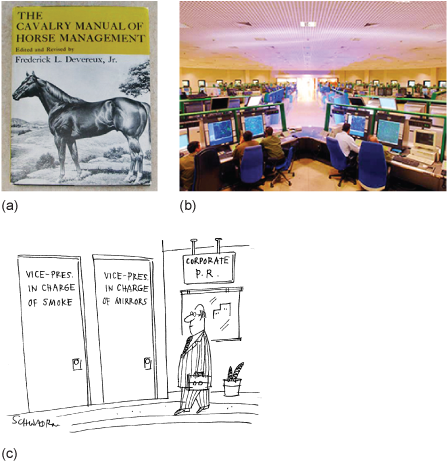2 Defining management
As with ‘environment’, the etymology of ‘management’ is revealing.
According to the Oxford English Dictionary, the English verb to ‘manage’ is derived from the thirteenth-century Italian maneggiare meaning to handle or to be able to use skilfully. ‘Manage’ was originally used in English to refer specifically to the directing or training of a horse. Later instances of ‘manage’ refer to use, manipulation, to conduct, to administer, to organise, to take charge and to supervise or control . It is no surprise then that ‘management’ is generally used to refer to:
Organisation, supervision, or direction; the application of skill or care in the manipulation, use, treatment, or control (of a thing or person), or in the conduct of something.
Whilst ‘management’ can often be associated with a positive interpretation in the sense that something is assumed to require management in order to ensure it is improved, it is notable that the dictionary definition also makes clear that ‘management’ can also refer to cunning, deceit, trickery and connivance!

‘Management’ can thus refer to an instance of managing, an administrative act, a governing body of an organisation or business, or the group of employees that administers and controls a business or industry, for example. It is also used to refer to the working or cultivation of land, in particular, control of a forest, environment or nature reserve, and, over time, has been extended to include maintenance, conservation and encouragement of natural resources, such as game, fish and wildlife. As with ‘environment’, you will encounter several uses and meanings of ‘management’.
In this free course, ‘management’ is used to refer to the act of managing to control, organise or put in place various arrangements for using some aspect of an environment comprising natural components (e.g. plants, rivers, soil), technologies and people by an individual, organisation or community.
It is important to add a note of caution here in that ‘management’ tends to imply that there is a known procedure, administrative process or skill set that can be used to control, organise or direct resources for some purpose. Whether these procedures and skills are known and available, and whether some environmental issues can be controlled is debatable.
Having established some sense of ‘environment’ and ‘management’, what do we mean when we combine the two terms into ‘environmental management’?
